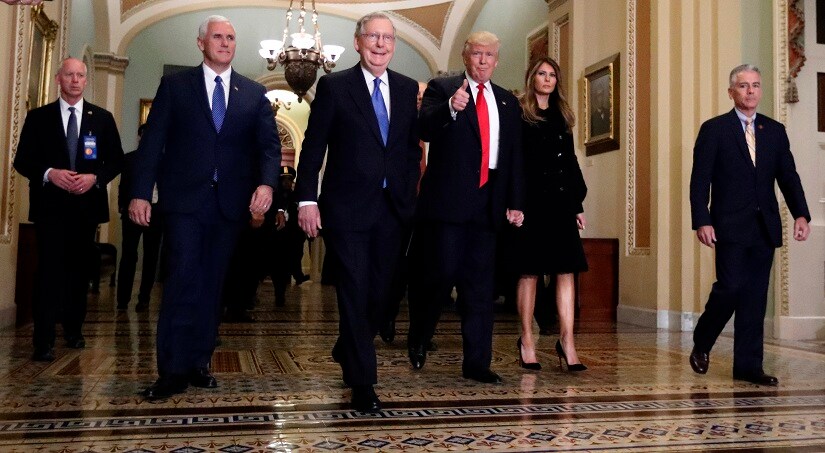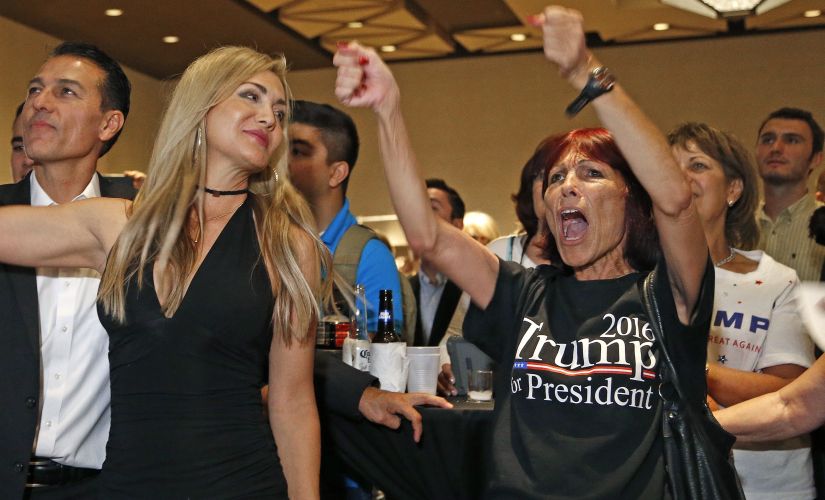It happened. It really did. There is an equal measure of delight and disgust flowing through the US as both sides of the divide attempt to come to terms with the events of 8 and 9 November. Needless to say, ‘if Donald Trump wins’ is one of those phrases that will be consigned to the dustbin of history for evermore. But, how? Weren’t we told, nay, reassured at various twists and turns in the US presidential campaign, that Hillary Clinton would be storming into the White House? That Bill Clinton would be the first US president and first gentleman? That there was no way in hell America would vote a man who has done little to alter perceptions that he is racist, xenophobic, misogynistic (although, I personally feel chauvinistic, as in male chauvinism, is a better fit here) and unfit to be president, to the White House? Let me return to my first question: Just how did Donald Trump with the election? And before I can attempt to stitch together an answer, there are a number of considerations that must be borne in mind. [caption id=“attachment_3101966” align=“alignnone” width=“825”]  Representational image. AP[/caption] The ’tear-it-all-down’ nihilism of the disenfranchised Numerous protesters in the three days since Trump’s election have been seen either chanting the words or carrying signs bearing the words ’not my president’. That’s likely the exact sentiment of those who voted for Trump towards Clinton — or more pertinently, the establishment. It would probably not be an overreach to suggest that a significant chunk of the population of the American heartland has little to do with Washington, DC, New York City or Los Angeles. In fact, this chunk can barely identify or relate to these cities that form the establishment. Washington: The political establishment. NYC: The economic establishment. LA: The cultural establishment. And percolating within the American heartland is the impression that none among this triumvirate has really looked out for the common working-class men and women or their interests. Not the government, which passes laws and takes decisions for them without considering their best interests. Not the fat cats on Wall Street, who care more about the value of their stock than a bunch of blue collar workers losing their jobs. And certainly not Hollywood that spares no effort in taking potshot after potshot at them. That’s where Trump came in. Sure, he was a New York billionaire, but he was their billionaire. This was a man who was as much an outsider as any of them: Equally chastised by Tinseltown’s finest — Clint Eastwood proving to be a major exception — as he was mocked by most movers and shakers on the Hill and held in low regard by fellow billionaires in the Big Apple. He would be their bulldozer when it came to tearing down a most vital arm of this establishment and as a result, perhaps even bringing about a change in the other two arms. To say it was simply anger that brought this segment of society to Trump’s corner was far more reductive. There’s a bit more to it. The US versus America We all had a good laugh during the film Borat: Cultural Learnings of America for Make Benefit Glorious Nation of Kazakhstan when the eponymous protagonist (played by Sacha Baron Cohen) repeatedly referred to the country he was visiting as “US and A”. Now a decade since the mockumentary’s theatrical release, we’re only just grasping the reality buried deep within his phrase and indeed the film. Readers may recall that the 90-odd-minute-long flick spends a majority of its time following Borat meeting people across the US, documenting its unwitting subjects make themselves fodder for our amusement. Did you notice the difference between how the people he met in New York City, Washington and Hollywood were made to look foolish compared to how those he met in the American heartland were made to look foolish? If you did, you’ll see where I’m going with this. As Borat said, there is a US and an A. The US is where the elite live. In fact, they’ll go to great lengths to point out to you that it’s the United States of America and not simply America. America, as they’ll also let you know, refers to the vast expanses of land between Cape Columbia in Canada and Ushuaia in Argentina. [caption id=“attachment_3101968” align=“alignnone” width=“825”]  A screengrab from ‘Borat’. YouTube[/caption] Then there’s the A — America. Home to the non-elite, who featured in the film as xenophobic, racist, homophobic, bigoted and misogynistic caricatures (sound familiar?). It’s this America that Trump prioritised over the course of his numerous speaking engagements and stated a desire to make ‘great again’. America has no hang-ups about calling itself that, because it is inhabited by a large percentage of no-nonsense blue collar workers. They can’t make sense of how someone who spends all day sitting behind a desk in an air-conditioned office earns more than them — who are working in factories or on farms, is more respected than them and enjoys a more comfortable life. Facebook and Twitter battles aren’t as much a priority in America as in the US. Neither for that matter is ideology (a preserve of the college-educated intelligentsia). To them, what matters is a president who has repeatedly sought to assure them that he’s listening and will make things better for them. It doesn’t matter that Trump failed to articulate any concrete policy proposals and that he stumbled unintelligibly through his debates. Debates are also the preserve of the intelligentsia. What Trump did successfully was to assure working-class America that he had a plan for them. And sometimes, that’s all it takes. Where’s my American dream, homes? While Trump was reaching out to working-class America, it could be argued that the focus of the Clinton campaign tended largely to be the non-White male segments. And apart from women, that meant Muslims, Hispanics and African-Americans. Trump may have been exuding immense ‘anti-immigration’ vibes, but they were hardly of his own creation. He was merely tapping into what have turned into very real concerns and fears in many American states. The first of these is the fear of Islamic terrorists masquerading as Syrian refugees and launching all sorts of attacks on the homeland. The second is that of illegal Hispanic immigrants taking jobs away from Americans. And the third is the fact that crime rates in the cities have been — one way or another, rightly or wrongly — linked to African-Americans and Hispanics. Undoubtedly, each of these three points has perfectly credible and correct counter-narratives replete with countless examples, but try and remember how often you’ve heard the phrase, “The suspect is a White male”? However, all three of the above points exacerbate an underlying condition that has been contributing to a growing disenchantment with Washington’s inability to provide working-class White America the American Dream. Economic inequality between them and the elites is already vast. But there’s also the gap between what they receive compared to the sorts of handouts perceived to be received by some African-Americans and Hispanics from the city. Coming to terms with this fact in the context of the last two fears is a difficult task and it begins to make a bit more sense why working-class White voters were left feeling hard done by and may have decided to go with Trump. After all, here was a man who was promising them the American dream. Political correctness gone mad? Trump had very early on the campaign trail come out and indicated that he rejected political correctness. This was one of the factors that led to his core constituency rejecting the narrative of his opponents, whether in the Republican primaries or in the main event. [caption id=“attachment_3101970” align=“alignnone” width=“825”]  Representational image. AP[/caption] To be clear, political correctness doesn’t only refer to eschewing phrases like ‘disabled’ in favour of ‘differently abled’. That’s just one dimension of it. What being PC has come to mean in 2016 is that it’s not enough to live and let and let live. Political correctness, as defined rather succinctly by Reason, is the social force that holds people who don’t necessarily understand something (like the third gender, for instance)in contempt for that, or punishes them outright. As the cited piece adds: (P)olitical correctness (to the people who voted for Trump) means this: Smug, entitled, elitist, privileged leftists jumping down the throats of ordinary folks who aren’t up-to-date on the latest requirements of progressive society. This phenomenon is loosely comparable to the activities on the Jawaharlal Nehru University campus over the course of this year, wherein students appeared to be agitating against any concept or idea that didn’t subscribe to their system of beliefs. There was nothing Trump seemed capable of saying over the course of the campaign that was remotely sensitive and his adoring core constituency lapped it up. This was evident in the way they shut down protestors at Trump rallies who were badmouthing or heckling the Republican from the crowd. Going low, going high or getting high didn’t seem to matter as much as becoming great again. Commentators, opponents, activists, students, celebrities and The New York Times missed out on few chances to call Trump ‘racist’, ‘sexist’, ‘xenophobic’, ‘Islamophobic’ and so on. What none of them noticed was that instead of breaking down his campaign, these barbs slowly began to bounce off Trump and later began to turn into badges of honour in the eyes of his core constituency. After all, wasn’t this the sort of stuff people called them? It was likely this that saw Trump endorsed by the Crusader, the Ku Klux Klan’s official newspaper. This seemed rather appropriate, coming as it did from the mouthpiece of a group that frames itself with the following description: Let me start by addressing the repeated falsehood that we are a “hate group”. Let me assure you that nothing could be further from the truth. We do not hate any group of people! However, we do hate some things that certain groups are doing to our race and our nation. We hate drugs, homosexuality, abortion and race-mixing… But rather than focus on hate, we try to focus on the love of our race. Of course, this isn’t to say that Trump is any way affiliated with the KKK, but it does indicate the sort of emotion he tapped into: The idea that White America is under threat. The mutations on both sides The alt-right and alt-left have been steadily emerging as movements over the years. And while both lack any obvious ideology, their philosophy appears to lie in the rejection of what the centre-right mainstream Republicans and centre-left mainstream Democrats respectively have to offer. Both groups are marked by two distinct similarities: A greatly heightened sense of paranoia, almost as if their lives and way of life was under threat and a knack for cyber-bullying their political adversaries. As noted in this piece on PJ Media, “(the) Democratic Party alt-left agitators protesting against Trump’s rallies in this campaign have illuminated nothing so much as the fact that the alt-right has no quarter on violence, bigotry, and thuggery”. So while the alt-left — that has been firmly in Vermont senator Bernie Sanders’ corner since the start — was reluctant in its support of Clinton once Sanders had bowed out of the race, the alt-right section offered its unwavering support to Trump. And now, it is the alt-left whose anger is pouring out into streets in protests across the US and American campuses. And they’re not just angry that Trump will be the 45th President of the United States. They’re equally furious at Clinton — who some believe wasn’t completely scrupulous in her defeat of Sanders over the course of the primaries — blowing the opportunity to win what should have been an easy win. It is still believed in many alt-left quarters that Sanders would have trounced Trump. But, whether a case of sour grapes or a genuine gripe, the reality is we have a Trump presidency ahead of us. To return to the starting premise of this article, how? It could be due to one or more of the factors above. It could be due to none of them. The fact of the matter is that it’s almost impossible to say with any sense of conviction just how Donald Trump was elected to be the 45th President of the United States.
But, whether a case of sour grapes or a genuine gripe, the reality is we have a Trump presidency ahead of us.
Advertisement
End of Article
Written by Karan Pradhan
Author tweets @karanpradhan_ see more


)

)
)
)
)
)
)
)
)



